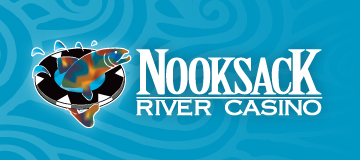Nooksack River Casino this year celebrated it's 19 year Anniversary as a proud member of the Deming, WA community. Deming is located just 15 minutes east of Bellingham, and 30 minutes south of the Sumas/Abbotsford border crossing.
Nooksack River Casino in Deming is an incorporated business owned and operated by the Nooksack Tribe, a federally recognized American Indian Nation of over 1800 enrolled members. Today the Nooksack Indian Tribe is the largest employer in eastern Whatcom County, and we look forward to continued growth and prosperity in order that we may share our success with the citizens of Whatcom County.
Please read on to learn more about the history of the Nooksack Tribe.
Our History
Five thousand years before pioneers came to the Nooksack River Valley, the Nooksack Indians were plunging shallow root nets into the river to catch Chinook, Coho and Chum salmon. They paddled the currents in shovel-nosed canoes fashioned from Western Red Cedar trading with the nearby Lummi and Chilliwack tribes. While the women and children would harvest the plentiful wildroot crops of berries and carrots, the men would hunt for mountain goat to harvest their meat and use the pelts for winter warmth and summer trade.
Their primary trade partners were the Sumas, Chilliwack and Matsqua tribes in B.C. To a lesser extent, they traded with coastal Lummis and Semiahmoos, and the Skagit Valley tribes.
About 450 Nooksack Indians lived in the valley in 27 villages on the shores of the Nooksack River. The largest settlements were near present-day Lynden (Squ-ha-lisb), Everson (Pop-a-homy) and (Kisk-a-well) where the river forks (Mile 14). Early Nooksack dug pit dwellings 4-12 feet deep over which they erected a bark tepee. Later generations built plank longhouses.
During spring and fall fish runs, 10 to 12 families would share a smokehouse on the riverbank next to fish traps. They’d catch, clean and dry thousands of salmon a day. Phoebe Judson, founder of Lynden, wrote that the Nooksack believed "the spirit of the fish dwells in its backbone and returns to the salt water to lure other salmon to their traps."
While the Nooksack lived a good life in relative isolation, the first contact with Europeans was not good. Prospectors used the Nooksack Valley as a highway to the gold fields in the Fraser River Valley in the 1850s without the Tribe’s permission. This led to bad feelings and the Nooksacks even attacked the town of Bellingham to protect their land.
In 1873 an effort was made to remove the Nooksacks to the Lummi Reservation. However, the Nooksacks returned to their upriver sites as they were not closely related by linguistic or kinship ties to the Lummi. In the mid-1930s the Nooksack tribe voted to accept the Wheeler-Howard Act and began working on a tribal constitution. Since they lacked a tribal land base, the Tribe was not given Federal recognition by the Bureau of Indian Affairs. In 1971, the Nooksack Tribe received full federal recognition. Reservation status was established on one acre of land in Deming, WA.

